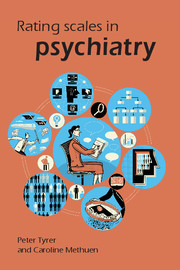Book contents
Introduction
Published online by Cambridge University Press: 01 January 2018
Summary
Many years ago one of us (P.T.) was lecturing on the use of rating scales at a conference on research methodology. In a light-hearted way, the well-known acronym for the standard format of a rating scale, SPITZER, was introduced. ‘Of course’, went the explanation, ‘we all know that the initials of the name stand for “Structured Psychiatric Interviews To Zealously Enhance Research”, and the core of research methodology is to remember this, over and over again, when carrying out your research’. This explanation was a little too convincing because subsequently several people commented that they did not realise that Spitzer was only an acronym, not a real person, and it was an eye-opener to understand the real meaning of the word. We hasten to remind you that Robert Spitzer is a real person, who has added a great deal to the science of rating scales, and is mentioned several times in this booklet. One of Bob Spitzer's famous saws is, ‘if it exists, it can be measured’, and these seven words offer both a rationale and a strategy for using such scales. In this booklet we have unashamedly gone for a measure of esteem that many find intensely irritating, the citation rate, because we feel that the more a scale is cited the more value it is to the researcher, and particularly the systematic reviewer. Such a reviewer measuring temperature can accommodate the Fahrenheit and Celsius scales, but would be very put out if there were forty other scales also measuring temperature in completely different ways. By giving the citation rates (as of 2006) of each scale we are not necessarily saying the most cited one is the best, but, other things being equal, if most investigators chose a scale that is very widely used it would be much appreciated by the reviewer and ultimately by the researcher too. Nevertheless, the many-faceted presentations of psychiatry mean that often a standard scale is not appropriate for the subject matter and so a much less frequently cited scale would be better in a particular project. So the exposition of several scales is sometimes necessary in order to achieve the best fit, and very occasionally it may be necessary to construct your own scale for a specific piece of research: as we make very clear, this should be done only as a last resort.
- Type
- Chapter
- Information
- Rating Scales in Psychiatry , pp. 1Publisher: Royal College of PsychiatristsPrint publication year: 2007



